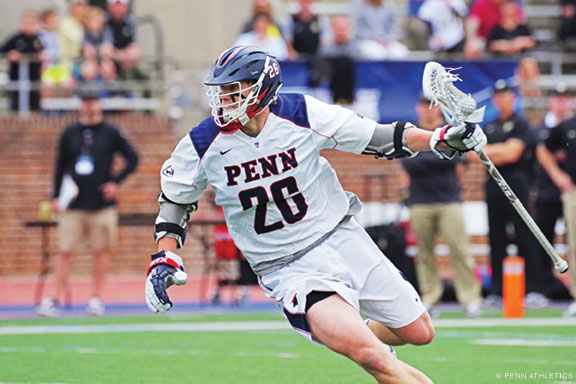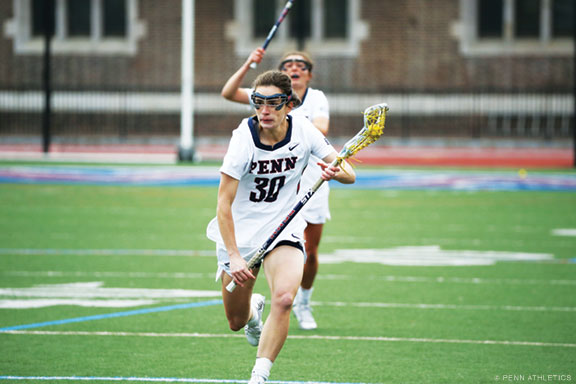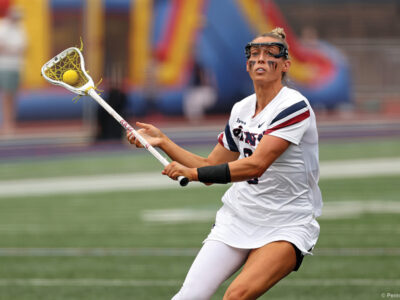

After two scuttled seasons, Penn’s national-caliber lacrosse teams return with lofty goals intact.
The afternoon, Mike Murphy GEd’04 says, remains clear in his head.
It was March 11, 2020, and the Ivy League had just canceled all athletic events through the remainder of the spring—one of the first of many dominoes to fall at the onset of the pandemic. Running a practice at Franklin Field when he found out, the Penn head men’s lacrosse coach delivered the bad news to his team and then gave the players the option to finish out one last practice together.
“To their credit, they chose to play,” Murphy says. “It was somewhat surreal and very emotional. Certain guys were exuberant. Other guys had tears in their eyes. Some were in shock.
“We had some fun with it,” he adds. “Then we started the slow, painful march toward nothing.”
Nothing, as it turned out, lasted far longer than most had imagined. Not only did Penn lacrosse join the rest of the world in those early shutdown days of 2020, but the Ivy League was also the only Division I conference to cancel spring sports the following year in 2021.
But two years later, the Quakers have emerged from the other side almost where they had left off—ranked in the top ten nationally in multiple preseason polls and primed to match or even improve upon a 2019 campaign in which they won their first Ivy League title and NCAA tournament game in 31 years.
“Even though we haven’t played in a while, we have some pretty good veterans,” Murphy says. “I think we can compete at the highest level this year.”
Penn’s women’s lacrosse team should also be able to compete at the highest level, as it usually does. Under head coach Karin Corbett, the Quakers have been a perennial Ivy League powerhouse, having qualified for 13 straight NCAA tournaments until the 2020 edition was canceled and the 2021 one proceeded without Ivy teams—a bitter pill for Corbett to swallow. “It was hard being the only conference in the entire country that didn’t play,” she says. “How do you explain that?”
Both Murphy and Corbett had held out hope the 2021 season would be played, especially as some creative options were explored, such as one Yale alum’s idea to create a lacrosse bubble to provide safe competition. But the league “just categorically rejected all of them,” Murphy says, “and nobody really knows why.”
Penn’s spring-sports teams were permitted to compete against local opponents last year, allowing both the men’s and women’s lacrosse squads to each play once in 2021 and send off their seniors. The men rolled past Cabrini, 23-9, with Adam Goldner W’21 setting a single-game program record with nine goals, while Zoe Belodeau C’21 reached the 100-goal milestone for her career as the women beat La Salle, 16-11.
Many players donned a uniform for the final time in those games, though Abby Bosco C’21 decided to extend her career as a graduate student at Maryland—following in the footsteps of Gabby Rosenzweig C’20, who played at Duke last season after setting the Penn record for career points before the 2020 season was canceled [“Sports,” May|Jun 2020]. The losses of those marquee players—plus Michaela McMahon, who transferred to the University of Southern California—“opens up spaces for other kids to step into those roles,” Corbett says.
“We’re young and inexperienced,” adds Corbett, who will lean heavily on seniors Ellen O’Callaghan on defense and Taylyn Stadler on the attack—two of the few team members with much on-field NCAA experience. “But we have eagerness, athleticism, and a competitive spirit that we hope we can keep growing and have us ready for the end of the season.”
The Quaker men might have a little more experience and returning firepower, thanks in large part to Sam Handley, a first-team All-American who had 35 goals and 26 assists as a freshman in 2019. Now a senior (though with more eligibility ahead of him if he chooses to stay at Penn or attend another school), he’s “capable of doing some things that most people aren’t capable of doing,” Murphy says. “I’ve been fortunate to coach some pretty talented players, and he’s as talented as anyone I’ve been around.”
Murphy is also excited that two other key players—midfielder Ben Bedard and attacker Jack Schultz—took advantage of the Ivy League’s temporary change in policy to allow last year’s seniors to continue at their current schools as graduate students. And although he was nervous that the canceled 2021 season would negatively affect recruiting, he says the team has good classes coming through the pipeline in addition to a strong batch of freshmen.
While it’s hard to assess how either squad might stack up against the rest of the league when the Ivy schedule begins in March, both Murphy and Corbett are excited to test their mettle against longstanding rivals again and regain their footing as major players in the NCAA lacrosse landscape.
“I used to think the worst thing you can go through as a coach is losing a game, but not playing a game is worse,” says Murphy, adding that he’s tried to “lean on our perseverance while nurturing our passion” to maintain a national-caliber program during such an extended delay.
Corbett echoes the sentiment. “It’s a hard thing,” she says. “It was so devastating for our seniors to miss two years of playing, so we’ve been balancing empathy with upholding standards of who we are and what our expectations are.”
Spotlight on Swimming
It’s not too often that Penn swim meets become a magnet for media coverage, save for the occasional Daily Pennsylvanian student reporter. But when Penn hosted Yale on January 8, outlets ranging from the Associated Press to Fox News to the British tabloid the Daily Mail descended on Sheerr Pool to watch Lia Thomas, a transgender member of the Quakers’ women’s swimming team.
Thomas, who competed for three seasons on Penn’s men’s team before transitioning during the pandemic, began making national waves after she set program records and posted automatic NCAA qualifying times at a December invitational. Although she was in compliance with the NCAA’s transgender policy, which allowed a trans woman to compete on a women’s team after completing one year of testosterone suppression treatment, she found herself at the center of a maelstrom over issues of inclusion and fairness in athletics, driven largely by right-wing outlets publishing anonymous quotes from upset teammates, competitors, and parents.
Thomas has only granted one interview, with the SwimSwam podcast in early December, while Penn swimming coach Mike Schnur has not commented publicly. Both Penn and the Ivy League released statements in support of Thomas on January 6.
“Lia Thomas has met or exceeded all NCAA protocols over the past two years for a transgender female student-athlete to compete for a women’s team,” Penn Athletics wrote. “She will continue to represent the Penn women’s swimming team in competition this season.” And the statement from conference headquarters read in part: “The Ivy League reaffirms its unwavering commitment to providing an inclusive environment for all student-athletes while condemning transphobia and discrimination in any form.”
Later in January, the NCAA opted to change its policy to allow the national governing body for each sport to determine the eligibility of transgender athletes, who will need to document sport-specific testosterone levels beginning four weeks before that sport’s championship selections. The shift left Thomas’s participation in the NCAA championships in mid-March, for which she had already qualified in multiple distance freestyle events, in doubt.
But on February 11, the NCAA announced that it will not in fact adopt USA Swimming’s stricter new policy for transgender athletes in the middle of this season—an about-face that seemed to clear the way for Thomas to compete for national titles.
Meanwhile, criticism and support for Thomas continued to swirl. On the same week in early February that a letter was written on behalf of 16 unnamed members of Penn’s swim team claiming Thomas “holds an unfair advantage over competition in the women’s category,” other members of the team released an unsigned statement backing their teammate.
“We want to express our full support for Lia in her transition,” the athletes wrote. “We value her as a person, teammate, and friend. The sentiments put forward by an anonymous member of our team are not representative of the feelings, values, and opinions of the entire Penn team, composed of 39 women with diverse backgrounds.” —DZ




